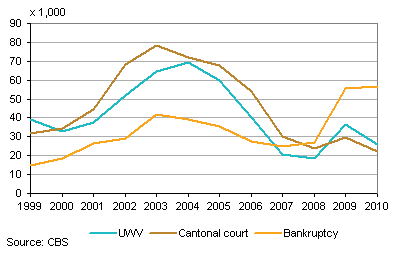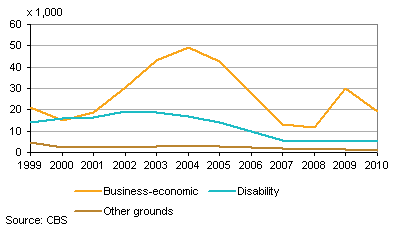Fewer compulsory redundancies in 2010

In 2010, 105 thousand people in the Netherlands were made redundant. The number of compulsory redundancies was higher in 2009, at 122 thousand. The 14 percent decrease was accounted for by the economic recovery.
Compulsory redundancy

Small rise in 2009
Compulsory redundancy of employees can take place on the initiative of employers (via the cantonal court or the UWV - the organisation for the implementation of employee insurance schemes) or because of bankruptcy.
In 2009, the number of compulsory redundancies rose substantially as a result of the economic recession, but by much less than in the period 2001-2003. One reason for this smaller increase was the introduction of a temporary scheme in 2009, under which employees were paid partial unemployment benefit for shorter working hours. This meant that companies could retain employees they would otherwise have to dismiss.
Redundancies down 14 percent in 2010
As a result of the economic recovery, the number of redundancies fell by 14 percent in 2010. Cantonal courts received 22.1 thousand redundancy applications, one quarter fewer than in 2009. The UWV granted 25.7 thousand redundancy permits in 2010, 30 percent down on 2009.
The number of bankruptcy-related redundancies rose on the other hand: from 55.4 thousand in 2009 to 56.8 thousand in 2010. Although fewer businesses went bankrupt than in 2009, some of those did were large companies employing relatively many people.
Redundancies via UWV, cantonal court, or bankruptcy

UWV: mainly business-economic motives
Redundancy applications granted by the UWV usually concern business-economic motives. This was the case for three-quarters of redundancies granted through the UWV in 2010. In these cases employers cite factors such as financial problems, business reorganisation or discontinuation of certain activities.
Fewer disability-related redundancies
Another common reason for dismissal via the UWV is disability. A clear decrease has been measured in disability-related redundancies in recent years. In 2010, the granted UWV 5.3 thousand redundancies on grounds of disability. In 2002 this was still as many as 19.4 thousand.
The decrease is probably accounted for by the implementation of measures to reduce disability, such as the ‘Gatekeeper Act’ introduced in 2002 and legislation requiring employers to continue to pay employees for the first two years of sickness/disability in 2004.
Dismissal permits granted by UWV or CWI by reason

Arno Sprangers and Vinodh Lalta